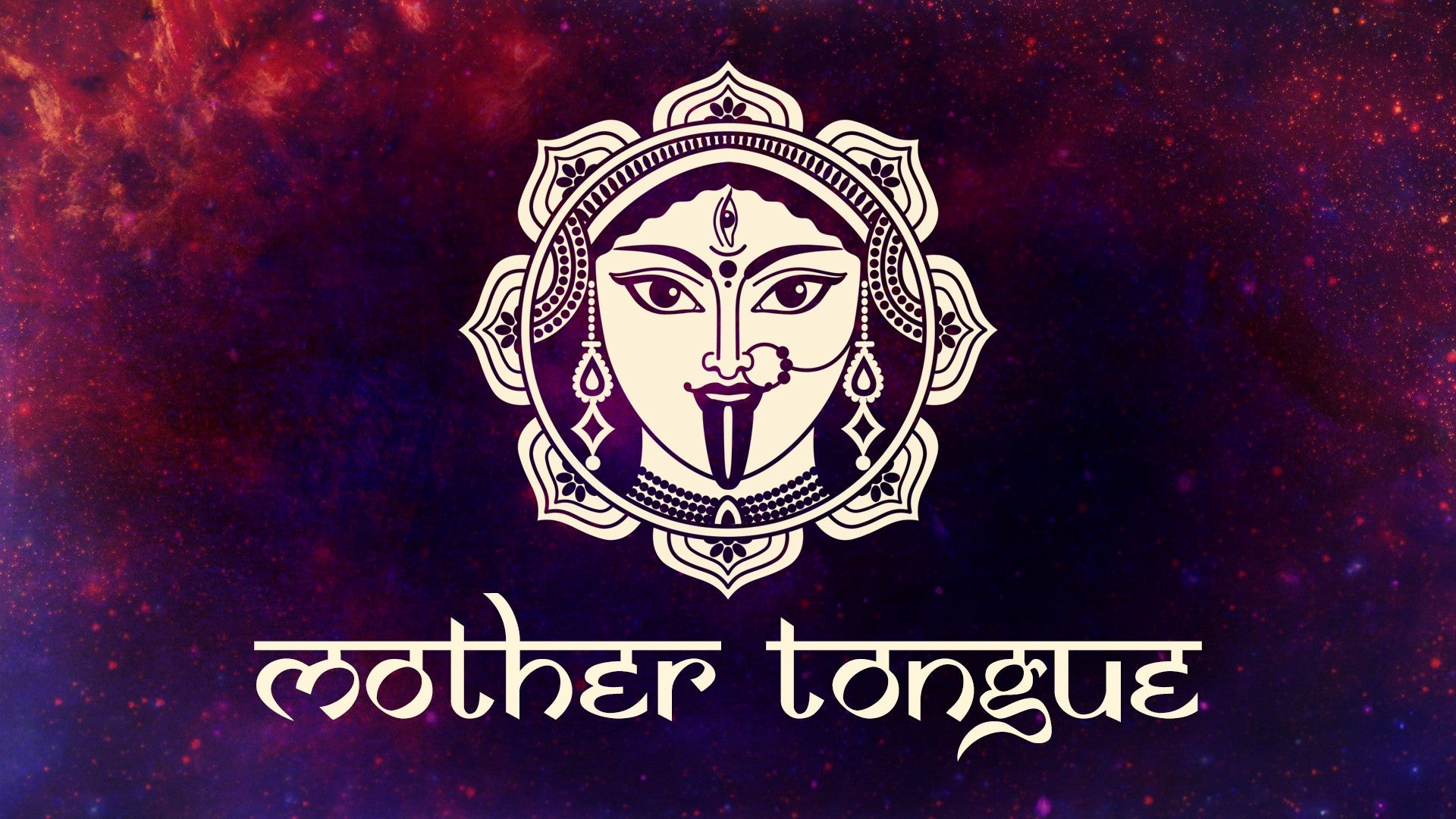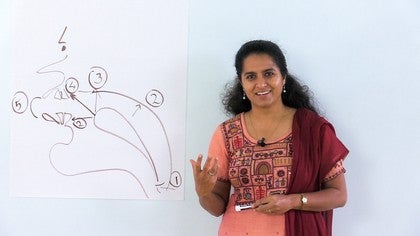Description
About This Video
Transcript
Read Full Transcript
Hi, thanks for joining us. And Anuradha, thank you so much for being with us. Thank you for having me over. I first met Anuradha online. It had become time to begin the study of Sanskrit. It was time to stop relying on others translations, fumbling through pronunciation on my own. And I actually engaged with a teacher here in Santa Barbara, Dr. James Powell. But he just wasn't as available as much as I needed him. So I went to YouTube where I found Anuradha. And it was just so clear that this was the woman I wanted to study with. And so she so kindly agreed to begin to Skype and then was convinced to come over to America last year for the first time and now has come back and has agreed to begin to attempt to put together an online Sanskrit course for all of us. So again. So let's just begin with how you came to the study of Sanskrit. Tell us this story. I studied in a school connected to an ashram, the Sri Aurobindo ashram. And in that school they believed that Sanskrit should be the language of every Indian child. And so they start teaching Sanskrit right from kindergarten. In fact they start with Sanskrit and French. And as we study on then we learn English and our mother tongue. But we study Sanskrit throughout our education which goes from kindergarten right up to our college. And at a certain stage we do get a choice of whether we want to continue with Sanskrit or choose other things. But I for whatever reason was fascinated by the language, by the different aspects of this language which is so special. And what was unique also about our school is that they taught Sanskrit in a living manner. As in Sanskrit was taught through Sanskrit which is not necessarily the case. In many other schools in India they teach Sanskrit in their the local languages or in English. So you can study Sanskrit and write an exam in Sanskrit but using the English language. So but since they were doing it in a in the original sense like they were teaching Sanskrit in Sanskrit I was quite fascinated about the sound of the language, the spoken aspect of the language. And then in our college we had the freedom to choose our own subjects, our own teachers etc. And I chose to do Sanskrit there. And what really got me about wanting to pursue this language for the rest of my life really seriously was that in my final year of college we had to do a project presentation. And I chose to study the Vedas as interpreted by Sri Aurobindo, this philosopher sage or who's ashram I grew up in. And what Sri Aurobindo says is that he has this fantastic passage where he says I seek not science, I seek not religion, I seek I seek a text that will be forever new which will question everything and yet not just push anything away as blind superstition but use common sense you know and really he has a very powerful passage on that. And at the end he says I seek not science, I seek not theosophy, I seek the Vedas knowing which everything here is known. So for me that was fascinating because I have a very high regard for Sri Aurobindo and his knowledge of the Western world and the Eastern world. So if a man of his caliber had something so powerful to say about Sanskrit about the Vedas I said that's a text worth studying. And so I went ahead and chose to study Sanskrit further. Now just because I'm not sure that everybody knows who Sri Aurobindo is or why you might have been studying French along with Sanskrit can you just it's a can you just help our friends know a little bit more about Sri Aurobindo. So Sri Aurobindo is a philosopher sage of the of contemporary India. He lived from 1872 up to 1950. He played a leading role in the revolutionary movement the freedom struggle from the British but before that he grew up entirely in the UK. He studied in Cambridge and studied all the classics all of that and then was inspired to come and join the freedom struggle. And when he did that he felt the need to connect to the culture in a deeper manner and studied a lot of the Indian texts Sanskrit as well as part of that. And went on to follow his spiritual pass from 1910. He retired to Pondicherry because the British were after him and once there there was another French lady called Mira Alfasa whom we called the mother who had started meditating at the age of five. And in her meditations she would see this guide whom she called Krishna. So when she came to visit Pondicherry in 1914 and she saw Sri Aurobindo she recognized him instantly as her Krishna and surrendered herself to him completely and they became spiritual collaborators for the philosophy that they co-founded known as the integral yoga which seeks and perfection of all the parts of the being. So they founded the school rather once the war broke out there were many children who came to the ashram which originally was meant for very strict sadhana people were there for their spiritual practice. So when these children came in she felt the need to start a school and the reason why she chose French instead of English was she felt that the French language helps to format the brain in a more precise manner than English does. So they introduced French for that reason and Sanskrit she said was this was the language of the soul of India and therefore every child in India should know Sanskrit. Like every child in France knows French, every child in India should know Sanskrit.
And tell us a little bit more about help us understand the origins and evolution of Sanskrit. So the oldest recorded text that we have in the world are the Rig Vedas, a collection of various hymns which are in Sanskrit. So from that point of view one can say that Sanskrit is the oldest language and the word Sanskrit itself is very beautiful because it's composed of two parts there is some krit. Okay some means from all side and well. Krit comes from the root kru which means done. So Sanskrit is a language which is perfectly done from all sides and its impact on anyone who engages with it is that it helps to refine the individual and bring in that quality of perfection within the individual as well who studies it. So that was the first the first time that we or Sanskrit was available and from there we then had it evolved gradually because the quality of Vedic Sanskrit was that it was mainly in a form of mantras which implies that they were these texts were considered as revelations of spiritual masters and therefore they were not considered to be composed by the human mind traditionally. We have a term a power share which means it is not of the human being not created by the human mind and therefore this line the language of the Vedas has a slightly different quality in terms of its power and creation than the language that evolved later on. The later language which is known as classical Sanskrit was used for the composition of different texts, different sciences. So just as today English is the language as a language which is used as a basis for all kinds all forms of knowledge on every subject on earth. At one point in India Sanskrit played that role so we find texts of every kind in this language and in great depth also. So it's the longest surviving language in the world in a sense. So then why sometimes is it thought of as a it's been presented as a dead language. Is this not true? Not at all, not at all. Since it was the language of the scriptures very often it is likened to Latin in the Western world and therefore people believe that you know just as Latin got restricted only to the classics and was not spoken anymore later on. Sanskrit too people had this impression that it or rather it ceased to be spoken by the people but the main difference is that okay let me tell you this that there is a certain political reason where which brought about this notion that Sanskrit is a dead language. So during colonial India the British were keen on trying to change the minds of the Indian people and one of the ways they resorted to that was by shutting down a lot of Sanskrit schools which still were you know teaching it as a very living language. So when the language ceased to be taught they also propagated the slide that Sanskrit is a dead language and the manner in which it was taught was also made very difficult. So as time went by this notion that Sanskrit is a dead language became a truth because it was a repeated lie and so people tend to think that Sanskrit is a dead language but the fact is that it is very much a living language there are many communities that still speak it and I would especially like to mention an organization called Samskrita Bharati which is dedicated itself to the promotion of this language as a living spoken language of the masses and they have evolved a fantastic methodology by which they can make people speak Sanskrit in ten days. Couldn't have got easier. And so in addition to the Indian people and the masses speaking Sanskrit why is it important for a student of yoga to practice and learn Sanskrit? It's a very important question I think because the entire yoga tradition has its roots in Sanskrit texts. So if one wanted to really touch the soul of the yoga tradition Sanskrit could play a very important role in providing some key elements or some key insights into what yoga really has to offer to an individual to anybody who seeks to understand more about themselves. Furthermore like if anybody in the Western world wants to study yoga they are and they want to know a little more about its philosophy they would resort to translations of texts and the difficulty with translations is that it invariably becomes a reduction of the original vision underlying any practice. So yeah the moment it becomes a reduction then you only take one part of the truth and that then is translated based on the limited understanding the individual has of that word. Whereas in Sanskrit the beauty of the language is that it every word provides myriad shades the richness that is there in the Sanskrit language is very hard to capture by single words in any other language. So when one has a translation if a yogi an aspiring yogi wants to resort to the original Sanskrit texts Sanskrit becomes inevitable and plus Sanskrit is the language of the mantra world which many yoga practitioners across the globe are connect very easily with and therefore if one understands Sanskrit or if one knows Sanskrit it facilitates correct pronunciation correct pronunciation delivers true more authentic experience. So there is a value for the yoga world to learn Sanskrit from the point of view of understanding the philosophy in its original context and also in terms of helping an individual resonate with the sound power of the language itself which can lead to experiences. On that can you speak a little bit more about the importance of the correct pronunciation within Sanskrit? You see in this in in the physical world there is a very intimate relationship between a sound and its effect. So for example if I make a particular sound I can break glass if I change that sound I no longer break glass and therefore to recognize the fact that sounds have a very direct effect not just on the physical level but also at the level of one's emotions. So if you listen to a particular kind of music you feel happy or you feel sad and therefore sound is having its impact on various levels of our being simultaneously.
Change of sounds creates change of effect. So it's not just at a level of an external experience it also pertains deeply to the the effect of these sounds on our bodies because the way the Sanskrit letters are arranged has a certain correspondence with the way they touch the different parts of our body and stimulate the different organs the different joints etc. So if one pronounces a word correctly the internal experience for the individual gets different. So I'd like to point out one particular word which is very often used at the end of all mantras which is the word shanti. In the English speaking word world because there is no the the family the family of sounds of the dental as in Sanskrit is absent one would end up probably saying something like shanti whereas the sound in its original sense is shanti and when one says shanti it has a completely different resonance for the individual so I think it can it can offer an alternative world experience world of experiences for a person. So how like how does somebody begin you know because you know sometimes we you know in the beginning we might do something badly and so how does one overcome the nervousness of mispronunciation as they are trying to learn the correct pronunciation. I think in a nutshell I can say that in a nutshell I can say that ultimately what counts is not just the expressed sound but the intention the sound of the intention is what matters so if an individual is honest is is true is a genuine seeker then the universe recognizes that they're doing their best and they'll not be so caught up with the correctness of the pronunciation but having said that I believe that in the yoga world where the quest is about discovering truth discovering the truth of oneself discovering and expressing truth at all levels of one's being when it comes to usage of sound I believe that if one is a seeker of truth in sound then in time one should seek to experience the correctness of sound as well for very selfish reasons because a change of pronunciation can result in a complete change of experience and Sanskrit in that sense can become like a yoga by itself so you can have something like a Sanskrit yoga correct correct pronunciations correct intentions and one will be enlightened. So it's my understanding then that really Sanskrit is your primary practice like I think I asked you once if you meditate and you laughed. When people ask me if I study Sanskrit I mean if I do any meditation practice I normally say no I speak Sanskrit and the inspiration for this confidence is the fact that I read an article called reading Sanskrit improves brain functioning it was an experiment conducted by Dr. Fred Travis of the Maharshi Institute of Management in Iowa and he basically made a group of people read the Bhagavad Gita which is a text in Sanskrit and they didn't understand the meaning of what they were saying but they could pronounce the words he made them read the text in modern languages as well so translations and then made them do transcendental meditation for about 15 minutes and what he did was he measured there the alpha coherence in the brain the galvanic skin resistance and concluded that those who read Sanskrit texts and those who did the meditation experienced the same physiological benefits which means that their skin resistance increased the alpha coherence in the brain was enhanced so he said that I mean to summarize his experiment he said that while the practice of transcendental meditation locates pure consciousness leading to a state of transcendental consciousness reading Sanskrit integrates inner and outer silence and activity helping to cultivate enlightenment because with meditation the eyes were shut so it facilitated this inner awareness but with Sanskrit you were engaging with the world and experiencing all the benefits couldn't get better so as our friends at home engage in this online course with you in speaking Sanskrit any encouragement or words of advice or wisdom to assist I have met many yoga practitioners who've been wanting to learn Sanskrit and who've tried learning Sanskrit and one thing they all end up telling me is that it's such a difficult language I agree that Sanskrit is complicated it's a very complex language because of the precision with which it has been expressed it has been codified so it is a complex language but a difficult language I would say not really it's a language which is like mathematics so if you know the if you know the formulas you've learned it forever so it's a it's really with Sanskrit it's a lot of a one-time serious dedicated investment once one has given that time to understand its structure which as I said is very mathematical what it would do is it can allow an individual to have a sense of confidence with that language and also a sense of a joy okay I'd like to share this because it was my personal experience with spoken Sanskrit I was in different Sanskrit camps at a certain moment and I ended up doing one whole month of an immersion in Sanskrit so I was only listening and speaking Sanskrit from there when I went into another camp where I had to speak English it was almost as if English was coming out from the tip of my tongue which to me showed how profoundly that language is impacting my body it's not about saying that one language is better than the other language every language is beautiful in its own way but languages impact our body our mind our understanding of the world in very very specific ways and the way Sanskrit can do it if one is receptive to it is that that is that it can fill one's being with joy and therefore my my suggestion and advice to anyone who wants to study Sanskrit is don't study Sanskrit with your mind study Sanskrit with your heart study Sanskrit from the sounds of the language if you can study Sanskrit as a living spoken language some sort of Bharati offers that opportunity but study it as a spoken language and then it it's a way that it touches the heart and that touching of the heart allows the logic of the language to be spontaneously understood yeah so it's it's said it's a joyful language it's a language that opens the heart the spirit so thank you for being here join us with honor Radha in the opening of the heart thank you
Mother Tongue: The Sound of Sanskrit
Comments
The organization helping revive spoken Sanskrit is Samskrita Bharati. You can find them here: //www.samskritabharatiusa.org
xo
k
So much depth and love. Learning Sanskrit,study with your heart and not your mind. Thank you for that key.
You have the secret code to tap into the wondrous beauty of Sanskrit .. open your heart, be fully present with Sanskrit and it will work its magic into your being :)
You need to be a subscriber to post a comment.
Please Log In or Create an Account to start your free trial.























